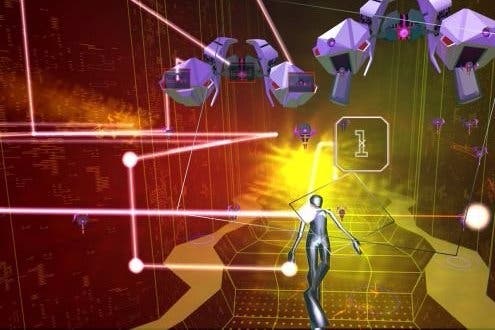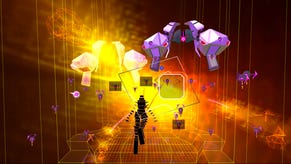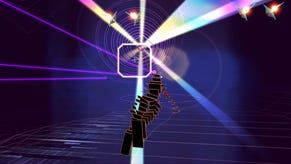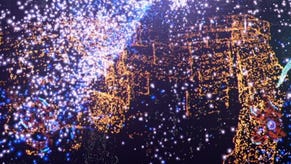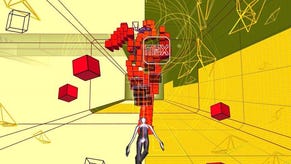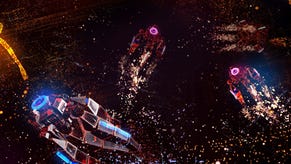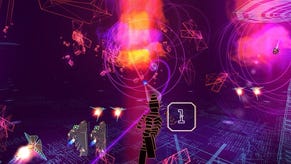Rez Infinite review
High rez.
Have you ever really played Rez? I thought I had, but now I'm not so sure. That very first time back in 2001 on the Dreamcast, through a soapy fog of weed in student halls and the hazy dawning realisation that games could offer so much more than they had done before, was just a rehearsal. Getting reacquainted a couple of years later with the PS2 version - a Trance Vibrator, borrowed from a friend, stuffed tastefully down the back of my shirt as I sat cross-legged on the floor on a brief respite from a summer's day trip - was merely a warm-up. Even playing it on a cinema projector after hours years later, using the up-rezzed HD version, fell some way short.
Now, some 15 years since that first experience, I have finally, properly played this modern masterpiece. Director Tetsuya Mizuguchi recently said he'd always envisioned VR as part of what he created while working for Sega's United Games Artists back in 2001, and it's more than a cute soundbite. Rez positively demands VR, giving a sense of presence and ceaseless motion unlike anything else out there as you float through its wireframe dreamscapes. VR, after all its false starts and some months into its second coming, has been asking for something like Rez too. The pair are so exquisite together as to be utterly irresistible. Playing Rez Infinite in VR for the first time is like viewing 2001: A Space Odyssey on 70mm for the first time, having previously only watched it via a 4:3 cut-and-shut on some scratchy old Maxell VHS tape.
Rez carries an air of mysticism, thanks in part to the 4am spirituality that courses through its levels - but in truth it's a simple game. You can easily trace its Sega lineage; draw back a few years and there's Panzer Dragoon, another on-rails shooter with a sense of impeccable style, while draw the line even further and you move past Afterburner and Space Harrier, whip-smart shooters that helped define their age. Rez took all that swagger and updated it for the neon-rush Tokyo nightlife of its own era, pushing an old arcade template into its final, most profound evolution.
For the five levels that return from the original Rez in Infinite - upscaled to support 4K on PlayStation Pro, repurposed for optional play on a PlayStation VR but still looking exquisite on a 1080p screen with a standard PS4 - the template is the same. Move on rails through levels that amp up their own intensity, controlling a reticule to scan and shoot down enemies before taking on a final boss. That's at the most fundamental level, anyway. Of course, Rez is much more than that.
Each level is a self-contained music track, beginning with sparse analogue stabs before your progression layers in thudding 808 and 909 backbeats and soaring MDMA synth crescendos. Amidst that soundscape you're the virtuoso player, your every action quantised until you're an integral part of each song; take down the cannon fodder and you'll unleash a skitter of snares, while larger foe will send out dancing synth lines in their death throes. Rez's genius is its willingness to let you improvise within its channels, and its open-armed invitation for you to come and play along. It's the warm embrace of an old friend dragging you back out to the dance floor as your favourite song fades in.
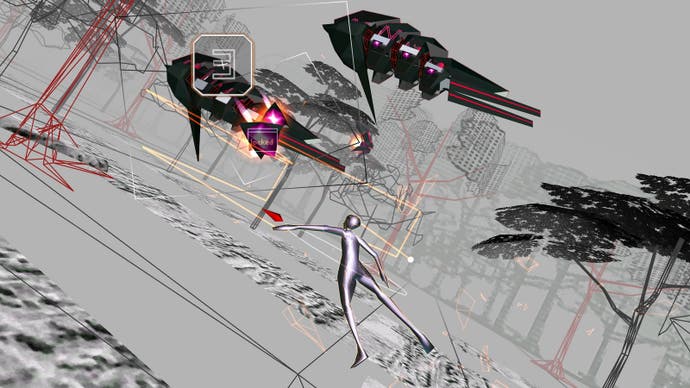
Other similar games have come since - Audiosurf or, more recently, Thumper, Rez's boisterous, glue-sniffing little brother - yet nothing matches the sheer sense of style here, or the purpose which infuses every pixel. There are progeny, but Rez still feels peerless, something which makes Infinite's all-new Area X even more of a treat. The rails are removed and you're afforded free flight through a soundscape painted in laser-dot pointillism, the dizzying rush of the original Rez placed into your own hands as you dance around. Played without a headset it's a thrill, and as close to a pure Rez sequel as we've been since 2011's Child of Eden. Through PlayStation VR, it's something else entirely.
As are Rez's returning levels. Bringing 2001: A Space Odyssey to mind again (something Rez, with its space baby and final crash of evolution towards its end, is more than happy to do itself), they combine to be the ultimate trip. It's not just the immersion - the feeling of being wrapped up amidst these dancing wireframes so tight you feel yourself pulsing along with them - but the way that Rez seems like it was always intended for this medium. The head-tracking that controls the reticule when playing with a VR headset removes another barrier between yourself and the game, and its implementation is spotless. Perhaps Rez is now a little too easy, with the extra level of control afforded, but it's a small price to pay for such incredible immersion.
When all that comes together in Rez's standout moments - the chittering dance as you're swarmed during the boss fight at the end of Area 3, the stuttering swell of strings that brings Adam Freeland's Fear to brilliant life as you rush up from the oceans of Area 5 - it's beyond sublime. Back when it was released, there were some complaints that the 60 minutes it takes to see through Rez constituted poor value for money. 15 years on, I think they're enough to justify investing in a VR headset.
